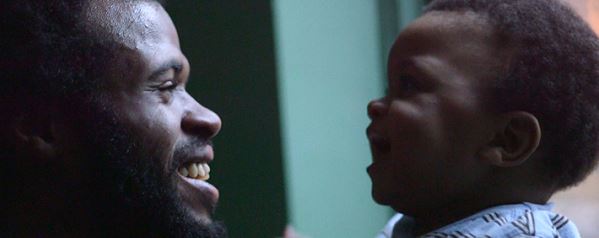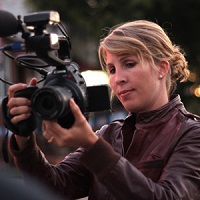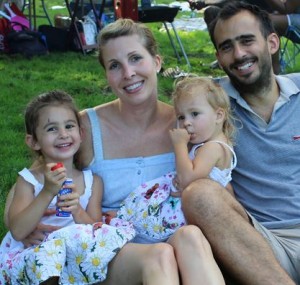At a time when one out of every three children in the U.S. grows up without a father, Emily Abt’s documentary Daddy Don’t Go—now in the final days of its Kickstarter campaign—offers intimate portraits of four racially diverse, economically disadvantaged dads who shatter the deadbeat dad stereotype, redefining what it means to be a good father for all men. The topic of parenthood holds special relevance for Abt; She’s a mother of two who has managed to succeed as an independent filmmaker—one of Variety magazine’s “Top 10 Directors to Watch,” she’s produced and directed documentaries for PBS, OWN, MTV, Showtime and the Sundance Channel—while performing the juggling act of raising two young children. Here, Abt shares some ups, downs and insights into the unique challenges of balancing family and filmmaking. How many films did you make before starting a family and how many since? Was there a plan in terms of the timing? I made two documentary feature films (Take It From Me, POV in 2001; All of Us Showtime 2008) and one narrative feature Toe to Toe before having kids. There was definitely a plan in terms of timing. I knew I had to get to Sundance before having babies. That was my big goal and I reached it.
Director Emily Abt
What was your childcare situation when you started making Daddy Don’t Go? My husband and I have a 50/50 deal. We split the bills and childcare duties evenly. My 2-year-old goes to daycare during the day and my 4-year-old is in pre-school. They also have a great babysitter who is flexible and is willing to work more hours when I need her to; This has been crucial. I work 40-50 hours a week depending on how busy I am. I’m lucky that I usually get home in time to make dinner and have a couple hours with the kids before they go to sleep. I also have an hour or so with them in the morning. However, when I have shoots, the hours can be crazy so I’m very thankful that my babysitter and husband are often able to step in for me at the last minute. I recently had a shoot that ended at 4 am and others have started at that hour. That’s when you need to be able to call in favors. When you had your first child, what was your biggest concern about balancing work and family? I worried that I wasn’t going to be able to make feature films for a while. That hasn’t turned out to be true but documentary filmmaking is definitely more of a family-friendly process than narrative filmmaking. I also worried about “Sophie’s Choice” situations where I’d be forced to choose between my kids and my love of filmmaking. The dust has settled on that and I feel more clear-headed about my priorities. I feel extremely blessed to be a mother. No film is more important to me than my family. That said, my daughters certainly aren’t going to throw me off my career track, that wouldn’t be good for any of us. In the short run it’s about a happy juggling process. In the long run, it’s about artfully balancing my two most beloved obsessions (filmmaking and mommyhood) in a way where the two compliment each other rather than compete with one another. I know this is possible. There will be hard choices along the way but I feel lucky to be making them. Has your family been supportive of you continuing in filmmaking after motherhood? Absolutely. I am blessed with a husband who always says “Go for it, we’ll make it work.” Has anyone ever told you to get a “real job?” Yes, all the time. Sometimes I even say that to myself! Do you ever second-guess your career choice? Luckily, no. Filmmaking is often very difficult financially but there’s no other option for me. I’m very passionate about what I do. Have you struggled financially? I was still waitressing at 30 to make ends meet. That was pretty humbling. I think the key to enduring the financial ups and downs of an artistic career is to stay flexible. That means keeping your expenses low but also protecting the time you need to grab for the big opportunities as they present themselves. One of the things I’m proud of about my career is that I’m a hustler and I’m entrepreneurial. A lot of women have trouble insisting they get paid decently but not me. I’m happy to do that screening or lecture but I will also kindly request that you pay me for my time. Was there a time you couldn’t afford something for your family? Every day! I currently live in a 2 bedroom apartment with my husband and 2 small children. I’d love to have more space for the kids some day (and I dream of a home office for myself) but I’d rather be a middle class filmmaker than a rich lawyer any day of the week. Who takes care of the children when you’re shooting? Their awesome dad or their awesome babysitter. Have you had specific situations where the challenges of being a mother and a filmmaker were most evident? The day before I went into production on my first narrative feature (Toe to Toe) I suffered a miscarriage. I didn’t have time to grieve, I just had to put one foot in front of the other and focus on the film. My crew consisted of mostly unmarried 20-somethings so I knew there wasn’t going to be a lot of sympathy, especially since I was pushing everybody really hard. So I just told the few people who I couldn’t hide it from but otherwise kept the loss to myself. The worst thing about the miscarriage was that it created an ongoing health issue for me that meant I had to go to the doctor every week while on location. Again, I kept this situation as discreet as I could. Directors need to be strong, focused and decisive on set. My personal situation was not relevant to the film so I made sure it didn’t become a distraction. Another story: After Sundance, I landed a big agent at William Morris (now WMEE). When I was doing the “bottled-water tour” whereby my agent sent me to meet various development executives, I was visibly pregnant. Sometimes there would be a quick glance at my belly and an air of dismissiveness soon followed. “I’m still in the game!” I felt like shouting. What are a few of the keys to making it all work. I’m still figuring that out. Flexible childcare has been important. And a flexible attitude as well. I think it’s important to enjoy the perks of being a freelancer (independence, freedom, etc.) while also keeping in mind that you have to treat every client like gold so they keep hiring you. When I land a great gig, I behave as if it might be my last—that’s how to ensure it won’t be.
Director Emily Abt with her family
What has surprised you about the difficulties of what you’re doing? I’ve learned the hard way that I’m not so happy when I have to miss the big moments in my kids’ lives. I was traveling for a commercial job on my daughter’s first birthday. It was a great job financially and I’d do it again but it certainly stung when I was Skyping with her from the airport as she blew out the candle on her first birthday cake. What I didn’t predict about juggling mommyhood and filmmaking is that some times the choices are made for you. I landed another excellent commercial job that required me to be on location in Texas for eight days when my daughter was 5-months-old. I really didn’t want to wean her so I pumped in the craziest of places, even in a trailer home where the whole crew could hear the very distinct sucking noise of my breast pump. But when I got home, my little one wanted nothing to do with breastfeeding and of course I felt terrible. She made that decision for me based on my own decision. So sometimes it’s just about doing the best you can and then accepting the fallout, good or bad. How is your experience as a parent inflected in your approach to Daddy Don’t Go? I love all the children in Daddy Don’t Go and of course they love me back because they can smell the “mommy” on me. I also feel very linked to the four fathers featured in Daddy Don’t Go on an emotional level. We know we’d do anything for our kids and that shared conviction bonds us. By Pamela Miller / Website & Grants Manager


